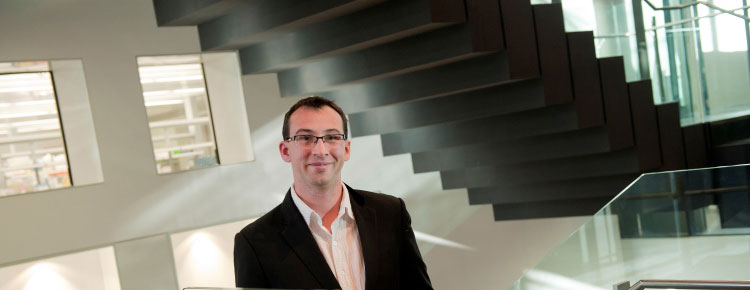Researcher Highlights
Building our future workplaces and work practices
Associate Professor Rohan Walker
Professor Rohan Walker brings a unique background in both psychology and neuroscience to his expertise in optimizing and redesigning work systems.
Through the Centre of Advanced Training Systems that he leads, Professor Walker has collaborated with some of Australia’s largest organisations, including the Australian Defence Force, the Defence Science and Technology Group, Ramsay Healthcare, QBE Insurance, Meat and Livestock Australia, Medibank, NSW Health, NSW Health Pathology, NSW Ambulance, Victoria Police, New Zealand Police, and others, to enhance work processes and training systems.

21st Century Training Systems
Initially interested in identifying strategies to reduce workplace stress, burnout, and psychological injury, it became clear to Professor Walker that many work systems, especially in large organisations, unintentionally create negative working environments. Professor Walker states, “Many large organisations often consist of multiple layers, each with distinct business verticals, operating with different KPIs, value sets, and timelines. Adding further complexity is when the benefits of work and work effort accumulate in different sections of the business and on different time scales. With complex work systems like this, it is very difficult to ‘fix’ one thing, replacing a single link on a rusted chain still leaves you with a rusted chain!”
In response to the challenges associated with creating excellent work environments, Professor Walker established the Centre of Advanced Training Systems. The Centre brings together experts from a broad array of disciplines with a mission to develop sophisticated, coherent, and impactful work systems for large organisations. While a central feature of all our work is training, it is important for any training to be aligned with organisational values, for values to be linked to clearly defined roles, responsive management systems, and that lines of effort comply with regulatory standards, and are quality assured by authentic assessment processes.
Since establishment in 2014 the Centre has been highly successful in large part because of our approach. When working with our partners we are highly collaborative. We do not seek to introduce products or services but rather find ways to work within a business to optimize and adapt existing systems such that staff are more connected, satisfied and fulfilled by their work activities.
In addition to the consultancy, benchmarking and evaluative work that the Centre does we have also worked with several organisations to develop customised training products. The most significant of these are Performance Edge, developed in partnership with the Australian Defence Force and TACTICS developed in partnership with NSW Health.
Performance Edge
Performance Edge is a virtual reality & biofeedback-enabled training platform developed for and with the Australian Defence Force. The six-module prototype program delivers practical training of stress management, pro-resiliency skills, and strategies to promote optimal performance under challenging conditions. A focus is placed on developing a comprehensive understanding of your own stress response and how to respond effectively under pressure. The training structure is intentionally modular, adjustable, and expandable. The training format is scalable and designed for easy classroom-based delivery. The platform has extensively been evaluated in multiple research trials with over 500 ADF and health care professionals to date.
TACTICS
TACTICS VR was developed initially in collaboration with leading stroke clinician Professor Chris Levi, a leading stroke clinician with the Hunter New England Local Health District. At the time, Chris indicated that the delivery of high-quality training into remote and regional sites was a significant barrier that was limiting the diffusion of best practice health care provision and was keen to explore the concept of training staff using a VR deployed package. This real-world challenge was an exciting one, that resulted in the development of the first TACTICS VR module that focused on training junior staff in how to manage stroke. This module was evaluated with a national trial with staff in NSW, SA, and QLD engaging with the training. On the back of this early work NSW Health expressed in an interest in expanding TACTICS and we have since gone on to develop four additional modules, including one for NSW Ambulance. The modules are now distributed by NSW Health to 28 hospitals across NSW supporting the delivery of best practice healthcare. Recently, the Centre has signed an agreement with the University of Utah to adapt the modules for use in the United States. We are now also expanding TACTICS into new fields of medicine with our most recent module being in Trauma medicine.
Innovative Models of Service Provision
Over the past decade Professor Walker has worked closely with the Centre for Rehab Innovations, led by Professor Michael Nilsson. CRI’s outlook, like the Centre for Advanced Training systems is highly applied and directed towards improving the future of Rehabilitation Services in the public and private sectors. Particularly notable projects that Professor Walker has collaborated on with CRI on is the award winning EngAGE project, undertaken in collaboration with the Hunter and Central Coast Primary Health Care Network, to reduce loneliness in the community via improving social connection through physical activity. Other projects have focused on understanding barriers to the delivery of care (Rehab Choices) with Medibank, advanced risk predictions tools with Ramsay Healthcare (SuperKnee), new approaches to promote best practice in primary healthcare (IMPACT) and best practice in psychological injury management (IMPROVE) with QBE.
The University of Newcastle acknowledges the traditional custodians of the lands within our footprint areas: Awabakal, Darkinjung, Biripai, Worimi, Wonnarua, and Eora Nations. We also pay respect to the wisdom of our Elders past and present.
